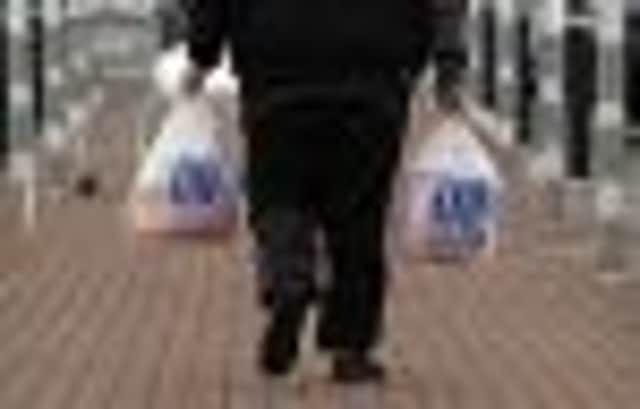Unexpected item in bagging area: a Tesco flop


Britain’s biggest retailer, which has weathered the economic downturn with year after year of sales growth, saw billions of pounds wiped off its value as the price of its shares plummeted 16 per cent yesterday.
New chief executive Philip Clarke – who took over from Terry Leahy last year – warned investors he expected profits for the coming year to be “minimal”, as it looked to inject hundreds of millions back into the UK business to give it a boost.
Advertisement
Hide AdAdvertisement
Hide AdIn a trading statement for the festive period, Tesco admitted Christmas sales had been poor, saying its Big Price Drop scheme had failed to deliver on profits and describing its UK like-for-like sales – in stores that have been open for more than a year – as “disappointing”.
Richard Hunter, from Hargreaves Lansdown Stockbrokers, said: “Unfortunately, the ‘big price drop’ reported in this update will be remembered as more reflective of the shares than the campaign.”
The announcement was bad news for the already struggling retail sector, which had previously heralded Tesco as being immune to the economic storm that has gathered around many of its high street counterparts.
The supermarket giant signalled the end of the roll-out of its huge hypermarket store formula and said it would focus on faster-growing, smaller stores and the internet, particularly for non-food products.
“In a challenging economic environment, we made good progress internationally, but, despite record sales, we are disappointed with our seasonal trading performance in the UK,” Tesco said in its statement to the London Stock Exchange.
“We delivered a very good Christmas shopping experience for our customers, but in a highly promotional market, the volume response to our increased investment into lowering prices did not offset the deflation it has driven.”
Gordon Emslie, a retail specialist at GNE Consultancy in Falkirk, said Mr Clarke had inherited a business facing a tough retail environment, as shoppers looked to save as much cash as possible amid squeezed budgets. Soaring petrol prices and utility bills have forced consumers to tighten their belts, with wages failing to keep pace with the rate of inflation.
But Mr Emslie warned Tesco may have lost its way in the battle for market share. “I think Tesco has had a challenge in trying to attack Asda on the Price Drop front,” he said.
Advertisement
Hide AdAdvertisement
Hide Ad“Prices went up quite steeply in the early part of last year, so when they began their moves to reduce them, people felt it was a bit of a con. There is a bit of a disconnect with their customers at the moment – I don’t think anyone’s sure at the moment who a Tesco customer is – and that’s the problem when a company is as successful as they have been, churning out increased like-for-like profits every year.
“I think a lot of people are shopping more in their local shops. They have £30 in their pocket and they feel it’s easier to shop in a convenience store where they buy what they need, rather than going to a large supermarket and being tempted by other things.
“Some of Tesco’s stores have just got too big and I think that some rivals, like Asda, have been just a little bit sharper on the internet shopping front.”
He added: “It is not a comfortable time for the new chief executive to have to report a profit warning on his first watch.”
But Mr Clarke insisted that, despite the poor Christmas performance, Tesco’s Big Price Drop campaign, which started last year and sparked strong discounting competition from rivals Asda, Sainsbury’s and Morrisons, was here to stay. And he hinted at a further roll-out of the scheme internationally. “This is not a matter of giving it time,” he said. “This is the first step.”
Even though sales slumped in the six weeks to 7 January, Mr Clarke pointed to the partial success of the campaign – Tesco’s sales volumes rose 1.5 per cent up to Christmas Eve – suggesting the promotion had tempted shoppers to the store, even if heavy discounting had pushed sales turnover lower.
Mr Clarke said there would be a clear bias in future away from opening UK hypermarket stores and towards relatively small outlets with a food slant.
He said this was partly because far more non-food Tesco products were being bought online, and so fewer hypermarkets were needed.
Advertisement
Hide AdAdvertisement
Hide AdHe added: “I’m not calling the end of hypermarkets. But in future the likelihood is that the stores that will open will be mainly food, with some complementary non-food.”
Tesco shares dropped by 61.5p to 323p by close of trading yesterday, wiping about £4bn off the company’s value.
Internationally, the company performed fairly well, seeing strong growth at both its European and Asian businesses – although it warned of “changing behaviour” outside the UK, as well as a “challenging consumer environment at home”.
Even in the US, where it has struggled to get brand Fresh & Easy off the ground, Tesco heralded a “very successful” Christmas and New Year period, with total sales – including new stores – growing by 41 per cent.